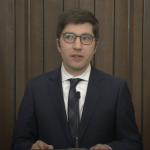The 2024 Great Canadian Death Race held Aug. 4-5, marks the fourth run that the Diocese of Saskatoon Catholic Foundation and the Roman Catholic Diocese of Saskatoon have promoted in support of the Indigenous Reconciliation Fund, beginning with the “Beaver Flat 50” in 2021 and continuing with the Death Race in 2022 and again in 2023.
Support Bishop Hagemoen’s fund-raising efforts for the Indigenous Reconciliation Fund by going to the Diocese of Saskatoon Catholic Foundation website: dscf.ca/annual-bishops-race.
By Bishop Mark Hagemoen, Roman Catholic Diocese of Saskatoon
Grande Cache, AB – This year’s race Aug. 4-5 was an experience of adventure, challenge, and fraternity. The two teams – Memento Mori and Bros & Bishops – finished their respective leg segments with respectable times.
Momento Mori finished 45 minutes earlier than Bros & Bishops, with the final time of completion at 1:12 a.m. The Racers faced different circumstances and challenges on the 118-km course.
On leg 1, Ryan Mallet encountered a debilitating knee injury. However, he worked through it to the end of his portion of the run – faithfully accompanied and supported by Luc Montpetit.
Leg 2 (Kieran Gillespie and Bishop Hagemoen) turned out to be very difficult. It was almost 30 kilometres, and climbed both Mt. Grande and Mt. Flood. The climbing and descending was relentless and steep, and as the day went on, the heat became a factor. Nonetheless, Kieran Gillespie had one of the leading times in the race for the leg. I struggled –especially with the heat – but completed the leg.
Leg 3 featured the combined efforts of Bishop Gary Franken and Ronan Gillespie. Bishop Gary started his leg mid-afternoon, and carried out a steady and respectable pace. Ronan Gillespie gained 40 minutes on the pace, and was in the top three fastest for Leg 3.
Leg 4 featured the climb up Mt. Hamel, and the long steady run-out from that summit. Jerome Montpetit accomplished this leg with a very respectable time, and was hardly winded at the finish. He even found time to send inspiring vista scenes via text on route.
Raphael Pelletier also accomplished a very good time on Leg 4, and indicated that the experience of the Mt. Hamel challenge was “incredibly crazy.”
The final leg was completed by Alex Pulvermacher and Max Connelly. The early experience of the initial climbs seemed ominous to both – especially when viewed at the end of the day in the dark. However, both described the journey – a long climb through the wilderness at night back into Grande Cache – was surprisingly peaceful and an experience of austerity and detachment.
Alex Pulvermacher arrived into Grande Cache with a strong and steady pace at about 12:45 a.m.
After completing his leg, Max Connelly stated, “the run was one of the most enriching experiences I have had, especially running in the dark and trusting in God’s care and providence.”
Upon receiving our team medals at 1:15 a.m., and coming back together for badly needed late-night nourishment – the teams awoke the next day and celebrated Sunday Mass with the Holy Cross Parish community in Grande Cache.
The community was very hospitable, and the pastor, Rev. Antony Narisetty, SAC, very welcoming and affirming of his experience of the team of bishops and young men during their stay at the church. However, we felt so blessed by the experience of being able to stay in a Catholic parish setting, with regular access to the church, and the ability to use the kitchen and other hall facilities for preparing and sharing meals, and for rest. And boy, did these young men eat!!!
One fact that was discovered later was that, for a portion of Bishop Gary’s leg (which he did with Ronan Gillespie) he was actually in his home diocese of St. Paul, Alberta! This diocese has a boundary that extends west to the Alberta – BC border. Bishop Gary’s leg went to the northern-most section of the race course, and he later checked the boundaries and discovered he had for a time been in his own diocese!
Gee, the extent a bishop goes to be present to the remotest areas of his diocese!
Meeting with President of Aseniwuche Winewak
Another feature of the trip was meeting David MacPhee, President of Aseniwuche Winewak First Nation at Suza Creek. Bishop Gary and I enjoyed a good sharing with Chief David, followed by lunch.

David MacPhee, President of Aseniwuche Winewak First Nation (Photo from https://keegitah.wordpress.com/)
One of the significant observations by Aseniwuche President MacPhee was about support by the Church for Indigenous communities. He stated that the efforts should continue to focus on the “head” AND the “heart.”
He indicated that communities appreciate and need the support of clergy and lay missionaries with both good teaching about the bible and faith, but this also needs to be coupled with programs that help people deal with their personal struggles, and support healing and personal growth.
Presient MacPhee stated that focusing only on ‘teaching’ can leave people wanting to achieve the goals of our faith, but this is unattainable without attending to necessary personal pain and hurt from challenging life experiences and circumstances. However, prioritizing only personal growth and healing can leave people in the difficulty of move beyond one’s self-focus to the greater calls to truth and meaning found together in community and illuminated by Christ’s life and teaching.
+++++++++++++++++++++++++++++++++++++++++
Efforts for Indigenous Reconciliation Fund
This year’s race was a challenging and rich experience, that will continue to motivate and challenge for the next stage of all our journeys.
I also pray that the dedication of my efforts for the race for our diocese’s Indigenous Reconciliation Fund (IRF) will continue to support our common awareness and efforts at healing and reconciliation – which is greatly needed in our dioceses, our country and our world today.







